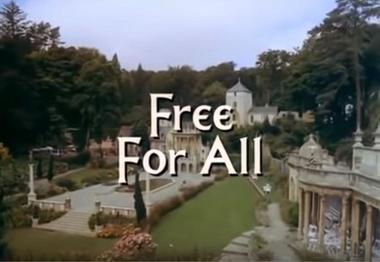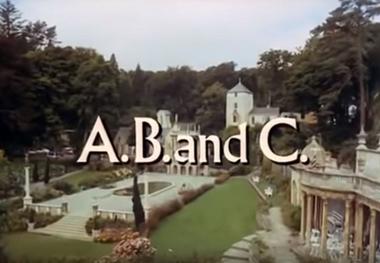
Rewind & Rewatch: The Prisoner – Free for All

I will start the fourth episode rewatch with my prologue from the first episode–as a caveat and introduction. Again, I’ll put this intro into an indented section to make it easier for people who’ve read it to skip it and get to the current episode.
I am starting a Rewind & Rewatch series on The Prisoner (the 1967 British series, created by Patrick McGoohan and George Markstein and starring McGoohan). I’ll be following the DVD episode order throughout this rewatch. In this series, I am merely looking for things of interest to me, ideas I find striking. This series is decidedly not a comprehensive review of The Prisoner, and these are certainly not my final thoughts on the TV series. It’s more like a set of notes. With any good piece of art, one can continually come back to it and find fecundity: missed elements, new relevancies, new avenues for thought. And, of course, there is already quite a bit of media surrounding the series, e.g., Time for Cakes and Ale has a separate podcast (“The Tally Ho”) reviewing the episodes, there is a fantastic website dedicated to the show (The Unmutal Website, which has articles and links to more writing about the show)–and, of course, there are numerous pop culture references to it. Despite all of this great content, I still feel compelled (for the sheer love of the show) to demonstrate my deficiencies! So, here we go…
It’s a “Free for All,” but not for the prisoner. The guise and cruel promise of ‘free elections’ is seen through the cynically keen eyes of Number 6 (after all, he is not a number! He is a free man!). He considers the game to be a way out, of course, as he is always looking for this angle. One suspects The Village knows this as well. But it is often unclear if the entire village is this astute. They are extremely enthusiastic, and this could certainly be acting. But there are times when he appears to fool them with his ‘enthusiasm’ for the ‘games.’
The first speech we see Number 2 give is particularly good in its surreal sixties imagery–the colorful capes and spinning umbrellas, the pageantry of politics on display (complete with cue cards telling the audience what to cheer).
The ‘truth-telling’ in the speech by Number 6 is encouraged by Number 2. It is part of the pageantry, part of the entertainment, and part of the manipulation. But Number 6 has fallen for the game–his look of surprise at the pre-made political sign of his campaign is truly shocking to him. He took the bait. They knew what he would do before he knew; they manipulated him into running.
“The Tally Ho” reporter/photographer scene replicates a particular view of news media as manipulative, sycophantic, celebrity-obsessed, and distortive (“no comments” are turned into positions he has not stated–except, of course, his one answer of “mind your own business” turned into “no comment”). The newspaper has already printed his “article” before the short car ride is over. Bested, once again: they know before he knows. The articles write themselves, seemingly. The media is an information filter and an influencer of sentiment, and one does not need to look far to see modern comparisons.
As the ‘opposition candidate,’ Number 6 is the stand-in for modern political games. Political analysis is clearly on display: systems play, privileging of moderate or populist positioning with more so-called ‘extreme’ candidates pushed to the fringes, media darlings are created and set up to fall, etc.
One must “play the game,” but Number 6 challenges the outgoing council’s lifeless zombies. Number 2 does not take kindly to the challenge and requires Number 6 to take “the test.” The test administrator assures Number 6 it is merely a “truth test.” But his thoughts are read by violent means, and he emerges a changed man–at least for a bit because he soon tries to escape. The psychological manipulations are too much for him to handle. The crowd chants of “6, 6, 6” (no doubt referencing diabolical sources) reverberate through his unconscious mind, and the control is truly psyche control for the character–i.e., this is a soul battle as well as a physical battle.
Has he succumbed to the manipulation? It seems so. He puts his whole effort into the election, with the results reflected in his message reach and crowd numbers. But the cracks are there and are showing through violent outbursts. So, Number 2 must manipulate him again. Number 6 “wins” the election and is taken to Number 2’s house to assume control of The Village. But the manipulation does not hold, and Number 6 attempts to free The Village while he has power. Thugs beat him into submission, bringing him to Number 2’s chamber–revealing that his “assistant” is the new Number 2. She asks if he is ready to talk. He does not answer her. Once again, the lengths to which Number 2 will go to manipulate Number 6 have no bounds. His “assistant” asks, “Will you never learn? This is only the beginning.” The episode ends with the former Number 2 flying away in his helicopter and the “assistant” assuring him that all will be satisfactory in the end.
The episode ends on manipulation, a theme running through the entire episode (and the series as a whole, of course). The episode highlights a few of the many “entry points” for psyche manipulation: media, mob mentality, self-deception, violence, false care, trust, and more. McGoohan is warning the audience of its own complicity in and potential receptiveness of these means of manipulation. Take care: hic sunt dracones.
Thanks for reading–and I’ll be back soon to continue my rewatch of The Prisoner. “Be seeing you”…



